The Butter Coffee Market is estimated to be valued at USD 102.5 billion in 2025 and is projected to reach USD 156.4 billion by 2035, registering a compound annual growth rate (CAGR) of 4.3% over the forecast period.
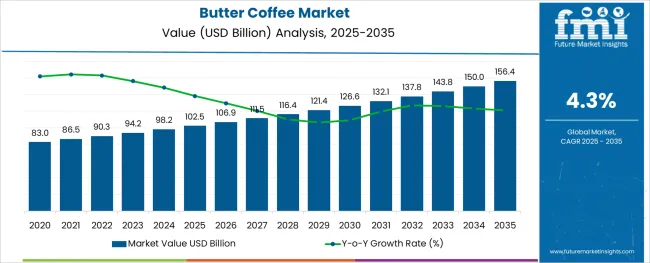
The butter coffee market is experiencing steady momentum as consumers increasingly seek functional beverages that offer sustained energy, cognitive support, and appetite management. This niche category, popularized through fitness, wellness, and ketogenic communities, has expanded beyond its initial audience to attract health-conscious consumers globally.
Demand for high-fat, low-carb beverage options has been amplified by rising interest in intermittent fasting, paleo, and low-sugar dietary patterns. While butter coffee remains a specialty product within broader ready-to-drink and instant coffee categories, strategic investments by emerging brands and artisanal producers have broadened market visibility and accessibility.
Over the next several years, favorable trends in health-centric beverages and consumer preference for on-the-go functional drinks are expected to strengthen market presence. Product development emphasizing organic, grass-fed, and plant-based fat sources is likely to cater to a diverse wellness-oriented audience. Additionally, enhanced e-commerce availability and social media-driven product awareness campaigns are projected to accelerate consumer trial and category adoption, ensuring a positive outlook for butter coffee in both mature and developing beverage markets.
The market is segmented by Nature and Distribution Channel and region. By Nature, the market is divided into Organic and Conventional. In terms of Distribution Channel, the market is classified into Online-store based retailing, Store-based retailing, Hypermarket/ supermarket, Convenience stores, Specialty stores, and Grocery stores. Regionally, the market is classified into North America, Latin America, Western Europe, Eastern Europe, Balkan & Baltic Countries, Russia & Belarus, Central Asia, East Asia, South Asia & Pacific, and the Middle East & Africa.
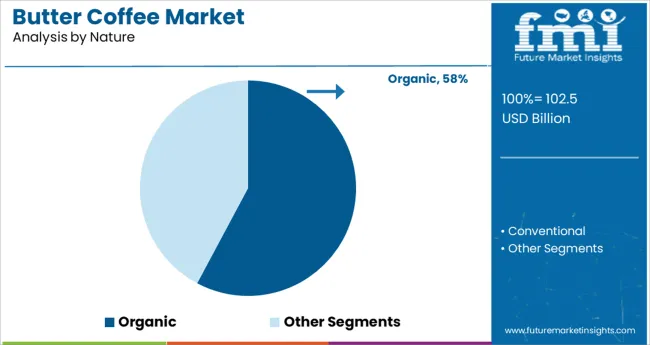
The organic segment secured a dominant 57.8% market share within the butter coffee market, driven by increasing consumer preference for clean-label, additive-free, and sustainably sourced ingredients. Health-conscious buyers, particularly within the wellness, fitness, and keto communities, have consistently shown strong inclination toward organic certified products, attributing higher value to quality assurance, ethical sourcing, and nutritional integrity.
The organic butter coffee segment benefits from alignment with wider trends in natural and functional beverages, where consumers are actively seeking products free from artificial preservatives, flavorings, and conventional dairy fats. Manufacturers have responded to this demand by emphasizing grass-fed organic butter and medium-chain triglyceride (MCT) oil blends in formulations.
Moreover, the perceived health advantages of organic ingredients in supporting metabolic health, mental clarity, and energy stability have reinforced consumer loyalty. The continued expansion of specialty organic coffee roasters and wellness beverage startups has ensured a steady influx of new product variants. Moving forward, sustained innovation in flavor profiles, plant-based organic fat alternatives, and eco-friendly packaging is anticipated to uphold this segment’s leading position.
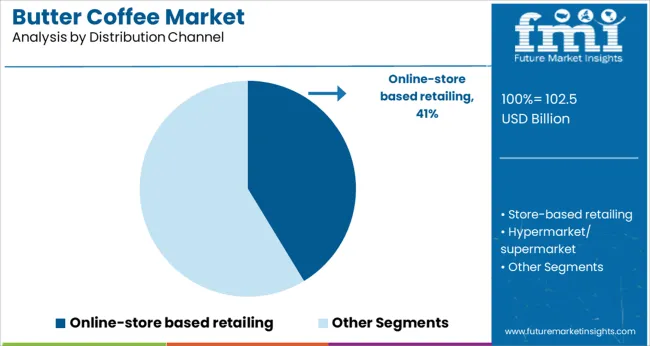
Online-store based retailing captured a significant 41.3% share within the butter coffee market’s distribution channel category, underscoring the growing importance of e-commerce in specialty beverage sales. The convenience, wide product availability, and targeted marketing capabilities offered by digital platforms have facilitated rapid category adoption, particularly among health-conscious millennials and fitness enthusiasts.
Consumers increasingly rely on online channels to access niche wellness products, limited-batch brands, and international formulations that are often unavailable in conventional retail stores. The rise of direct-to-consumer models, subscription services, and influencer-led brand collaborations has further enhanced product discovery and brand loyalty in the online segment.
Additionally, digital retail enables manufacturers to leverage consumer data analytics and social media engagement to refine product offerings and promotional strategies. The segment’s growth is further bolstered by the availability of product education, usage guides, and customer reviews, which aid in purchase decision-making for a relatively new beverage category. As e-commerce infrastructure and delivery networks expand, online-store based retailing is expected to retain its growth momentum and remain a primary channel for butter coffee sales.
Butter coffee is getting trendier among the population due to its several health benefits such as it supposedly curbs appetites, improves skin tone and complexion, and helps in weight loss. The benefits of butter coffee help to drive its market growth in the forecasted period.
It is majorly preferred by people who are on a diet because it is high in fat which makes drinkers feel full for as long as six hours and controls the hunger of the person. Many people who have experienced butter coffee in their daily diet also claim it’s brain food and help to improve mental acuity and focus.
These factors help to drive the current market demand for butter coffee in the beverages industry. As it is in an introductory phase there are very fewer numbers of players in the buttered coffee market, which showcases the opportunity for the new players to enter the market and serve the growing demand for butter coffee from the population.
Along with the number of drivers and opportunities, there is some restraint in the butter coffee market which restricts the growth of butter coffee in the beverage industry. Restraint such as high fat contains sometimes causes heart disease and high cholesterol.
This can be overcome by the proper intake of butter coffee and daily physical exercise, butter coffee cannot be consumed daily, due to its high content of fat.
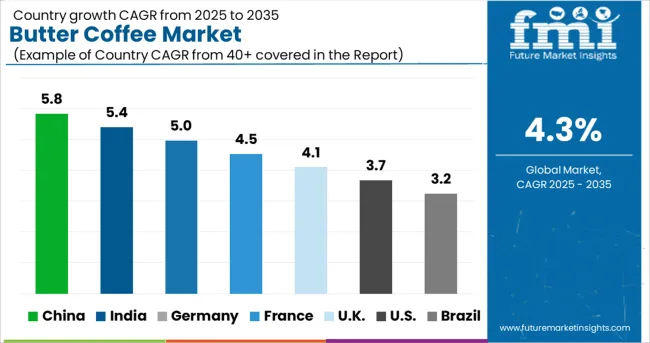
The global Butter Coffee market is majorly divided into seven regions, such as North America, Latin America, Europe, South Asia, East Asia, Middle East & Africa, and Oceania. Among all these regions the Asian region reflects the fastest-growing region due to the high increasing coffee consumption rate as compared to the other regions.
Which directly reflects the high opportunity for butter coffee as well. This is owing to the growing number of large middle-class young professionals and the consumer base is witnessing high coffee consumption. Other than this Europe holds the major share in the butter coffee market at the global level which is followed by North America due to a large number of coffee consumers.
The market for butter coffee is also expected to grow in these other regions during the forecast period.
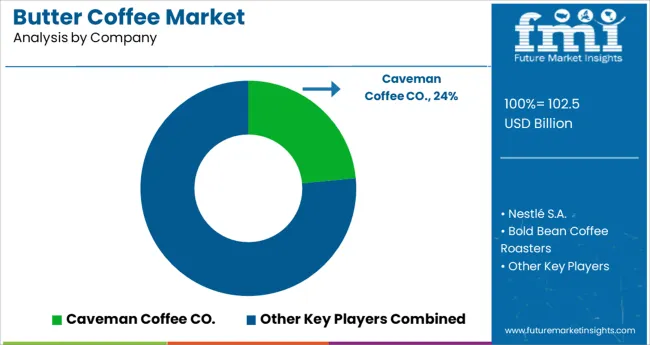
Butter coffee is trendier in the current scenario in the beverages industry owing to the health advantages to the consumer’s health. The butter coffee market is expected to grow in the forecasted period due to the changing eating trend of consumers in their daily life.
People are shifting more towards healthy and ready-to-eat products in their diet due to the increasing lifestyle diseases and busy lifestyles. Butter coffee is also trendier among people who follow a ketogenic diet, and the ratio is still growing. Butter coffee contains nutrients like vitamin A, where Vitamin A is necessary for skin health, immune function, and good vision which attracts more consumers.
The global butter coffee market has numerous small-scale and international manufacturers at the regional level. Few industry players are identified across the value chain of the global butter coffee market which are Caveman Coffee CO., Nestlé S.A., Bold Bean Coffee Roasters, Bulletproof Nutrition Inc., Hallstar
| Report Attribute | Details |
|---|---|
| Growth rate | CAGR of 4.32% from 2025 to 2035 |
| Base year for estimation | 2024 |
| Historical data | 2020 to 2024 |
| Forecast period | 2025 to 2035 |
| Quantitative units | Revenue in million/Billion and CAGR from 2025 to 2035 |
| Report coverage | Revenue forecast, volume forecast, company ranking, competitive landscape, growth factors, and trends, Pricing Analysis |
| Segments covered | Nature, Distribution Channel, & Region |
| Regional scope | North America (USA, Canada); Latin America (Mexico, Brazil); Europe (Germany, UK, France, Italy, Spain, Poland, Russia); East Asia (China, Japan, South Korea); South Asia (India, Thailand, Malaysia, Vietnam, Indonesia); Oceania (Australia, New Zealand); East & Africa (GCC Countries, Turkey, Northern Africa, South Africa) |
| Country scope | USA, Canada, Mexico, Brazil, Germany, UK, France, Italy, Spain, Poland, Russia, China, Japan, South Korea, India, Thailand, Malaysia, Vietnam, Indonesia, Australia, New Zealand, GCC Countries, Turkey, Northern Africa, South Africa |
| Key companies profiled | Caveman Coffee CO.; Nestlé S.A.; Bold Bean Coffee Roasters; Bulletproof Nutrition Inc.; Hallstar |
| Customization scope | Free report customization (equivalent to up to 8 analysts working days) with purchase. Addition or alteration to country, regional & segment scope. |
| Pricing and purchase options | Avail customized purchase options to meet your exact research needs. |
The global butter coffee market is estimated to be valued at USD 102.5 billion in 2025.
It is projected to reach USD 156.4 billion by 2035.
The market is expected to grow at a 4.3% CAGR between 2025 and 2035.
The key product types are organic and conventional.
online-store based retailing segment is expected to dominate with a 41.3% industry share in 2025.






Our Research Products

The "Full Research Suite" delivers actionable market intel, deep dives on markets or technologies, so clients act faster, cut risk, and unlock growth.

The Leaderboard benchmarks and ranks top vendors, classifying them as Established Leaders, Leading Challengers, or Disruptors & Challengers.

Locates where complements amplify value and substitutes erode it, forecasting net impact by horizon

We deliver granular, decision-grade intel: market sizing, 5-year forecasts, pricing, adoption, usage, revenue, and operational KPIs—plus competitor tracking, regulation, and value chains—across 60 countries broadly.

Spot the shifts before they hit your P&L. We track inflection points, adoption curves, pricing moves, and ecosystem plays to show where demand is heading, why it is changing, and what to do next across high-growth markets and disruptive tech

Real-time reads of user behavior. We track shifting priorities, perceptions of today’s and next-gen services, and provider experience, then pace how fast tech moves from trial to adoption, blending buyer, consumer, and channel inputs with social signals (#WhySwitch, #UX).

Partner with our analyst team to build a custom report designed around your business priorities. From analysing market trends to assessing competitors or crafting bespoke datasets, we tailor insights to your needs.
Supplier Intelligence
Discovery & Profiling
Capacity & Footprint
Performance & Risk
Compliance & Governance
Commercial Readiness
Who Supplies Whom
Scorecards & Shortlists
Playbooks & Docs
Category Intelligence
Definition & Scope
Demand & Use Cases
Cost Drivers
Market Structure
Supply Chain Map
Trade & Policy
Operating Norms
Deliverables
Buyer Intelligence
Account Basics
Spend & Scope
Procurement Model
Vendor Requirements
Terms & Policies
Entry Strategy
Pain Points & Triggers
Outputs
Pricing Analysis
Benchmarks
Trends
Should-Cost
Indexation
Landed Cost
Commercial Terms
Deliverables
Brand Analysis
Positioning & Value Prop
Share & Presence
Customer Evidence
Go-to-Market
Digital & Reputation
Compliance & Trust
KPIs & Gaps
Outputs
Full Research Suite comprises of:
Market outlook & trends analysis
Interviews & case studies
Strategic recommendations
Vendor profiles & capabilities analysis
5-year forecasts
8 regions and 60+ country-level data splits
Market segment data splits
12 months of continuous data updates
DELIVERED AS:
PDF EXCEL ONLINE
Butter Market Insights - Dairy Industry Expansion & Consumer Trends 2025 to 2035
Buttermilk Powder Market Analysis by Product Type, Sale Channel, and Region Through 2035
Butterfly Valves Market Analysis by Type, Mechanism, Function, Applications, and Region through 2035
Butter Flavor Market Trends – Food & Beverage Innovation 2025 to 2035
Butter Powder Market Growth – Applications & Demand 2025 to 2035
Analysis and Growth Projections for Butter and Margarine Business
Competitive Breakdown of Buttermilk Powder Providers
Butter Concentrate Market
Nut Butters Market Insights - Premium Spreads & Consumer Trends 2025 to 2035
Dry Buttermilk Market
Shea Butter Market Analysis - Size, Share, & Forecast Outlook 2025 to 2035
Aloe Butter Market
Kokum Butter Market Analysis by Application, End Use, and Region through 2035
Vegan Butter Market Insights - Dairy-Free Alternatives & Industry Growth 2025 to 2035
Cocoa Butter Market Analysis by Product Type, Nature, Form, and End Use Through 2035
Peanut Butter Market Analysis - Size, Share, and Forecast Outlook 2025 to 2035
Peanut Butter Keto Snacks Market Analysis - Trends & Growth 2025 to 2035
Lactic Butter Market Analysis - Size, Share & Forecast 2025 to 2035
Almond Butter Market Growth - Healthy Spreads & Industry Demand 2025 to 2035
Coconut Butter Market Analysis by End-use Application Sales Channel Through 2025 to 2035

Thank you!
You will receive an email from our Business Development Manager. Please be sure to check your SPAM/JUNK folder too.
Chat With
MaRIA